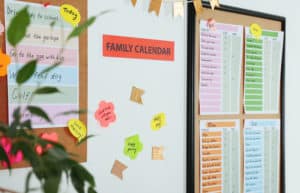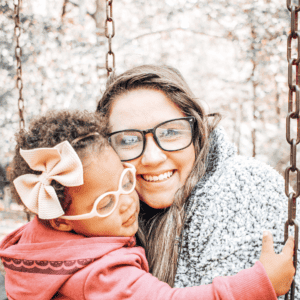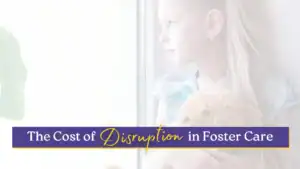My childhood dreams did not include being a foster parent. And they surely did not include being involved in foster care as a special needs parent. But I am so glad God is writing my story and not my childhood self.
I first became a foster parent in 2017. Somehow, someway, eight kids and four years later, I’m now writing an article on being involved in foster care as a special needs parent. Whether you are reading this because you want to be a foster parent or are a foster parent—or maybe you think the whole idea of fostering sounds awful—I encourage you to remember throughout reading my story that every child is made in the image of God. No matter the disability. No matter the diagnosis or list of appointments. Every child is made in God’s image.
What Is Special Needs Foster Care

Before moving forward, I want to define “special needs.” In a way, every child in foster care is a child who has special needs. It takes a village to care for a child in foster care, including social workers, lawyers, judges, therapists, teachers, CASA workers, biological family, foster parents, and their network of support. I consider “special needs” to be a very broad term to encompass any physical, emotional, or behavioral difficulty needing intervention.
All eight of the children I have fostered have needed some level of outside help. I’ve had children in physical therapy, speech therapy, vision therapy, occupational therapy, and psychological therapy. I have navigated the waters of public schools and IEPs (Individualized Education Programs). I have spent dozens of nights in the hospital. And time does not allow me to count the number of doctor’s appointments I have been to. Stepping into the world of foster care also means stepping into the world of special needs.
Encouragement for a Special Needs Foster Parent
Rest easy if you are reading this and feel like you can barely pronounce your child’s diagnoses, let alone become an expert in caring for them. I felt the same way at first and still sometimes do. To the parent fostering a child with special needs, trust yourself. I doubted myself a lot in the beginning, but I’ve found God gives you just what you need to tackle each challenge as a special needs foster parent.
God placed this child in your home. Not with the foster mom on the Facebook foster parent group, not with the Instagram foster mom influencer—God placed the child with you. Trust and pray that God will equip you to handle each doctor’s appointment, each therapy appointment, and each IEP meeting.
The Importance of Organization and Collaboration

Not only did God place the child in your home, but He also placed that child with a certain social worker, a certain GAL (guardian ad litem), a certain team of therapists and doctors, and a certain biological family. Work as best and appropriately as you can with all the people God has placed in this child’s life.
Get used to answering unknown numbers and utilizing tools like Trello and Google Calendar to organize all the meetings and therapies. Make sure the child is being properly informed on what’s going on with their care and, when safe and appropriate, include biological families too.
The goal of foster care is safe permanency for a child, often through reunification, and that is true for children with special needs too. So, the ultimate goal is for you to organize the child’s team of caretakers well so that a biological family member can take your place without disrupting the appointments and therapies the child has if reunification occurs.
Caring For Yourself as You Care for a Child with Special Needs
If all this seems overwhelming, it’s because it is. I came to a point where, after four years and eight kids, I developed compassion fatigue or burnout or whatever fancy word you want to use. I was done.
Therapy is Self-Care
Self-care is important for all parents but downright critical for parents who have kids with special needs in foster care. If you are already a special needs foster parent, I’m going to give a piece of advice that I already know will make you roll your eyes because I did at first: enroll yourself in therapy. Breathe—I know you’re probably thinking, “Not one more appointment!” and “I’m not the one with special needs!”

I get it. I do. But one of the biggest parenting realizations I have had is this: Parenting is mostly about you. Don’t hear this the wrong way. What I am saying is parenting is not so much “How do I get my kids to behave?” but “How do I control my anger and impatience when my kids do misbehave?” Parenting a child with special needs is not so much “How do I juggle all my kid’s appointments?” but “How do I handle stress or things not going my way?”
Understanding Your Own Trauma and Triggers
Before you can help a child overcome their triggers, you first need to know and overcome your own. Before diving deep into a child’s trauma, you need to dive deep into your own. Self-care, in this instance, is not candles and bubble baths. I’m calling you to hard work.
For me, therapy has helped with little things like understanding that if I feel stressed, I need to use the acronym HALT. Am I Hungry? Angry? Lonely? Or Tried? I have also learned breathing exercises. But therapy has also uncovered deep pain, trauma, and hurt that I’ve had to work through so that I can be a better caregiver to my kids.
The Moment I Became a Special Needs Foster Parent

“I could find you an easier kid,” the social worker said on the other end of the phone. I was about a month into the hardest foster care case in terms of special needs I have had. On top of that, I was pregnant and sick too. This child had about five specialists and three therapies and counting. I remember a few nights before caring for her at 2 a.m. thinking, “I’m not sure I can do this anymore.” The social worker had called me that day to tell me the state had decided to make the child “medically fragile,” meaning I would have to go through an extra 12 hours of training, including a weekend conference plus an additional twelve hours for the initial training. I was at a crossroads.
Did I want an “easier kid”? Whatever that even means. “No,” I said. And at that moment, I felt more sure of my answer than any answer I have given except becoming a Christian. “I don’t want an easier child. I want her.” Two years and some days later, that little girl became my forever daughter.
It is worth it, friend. Every child is worth it.
















